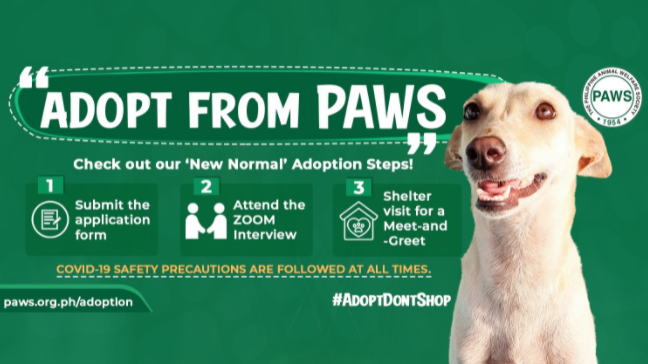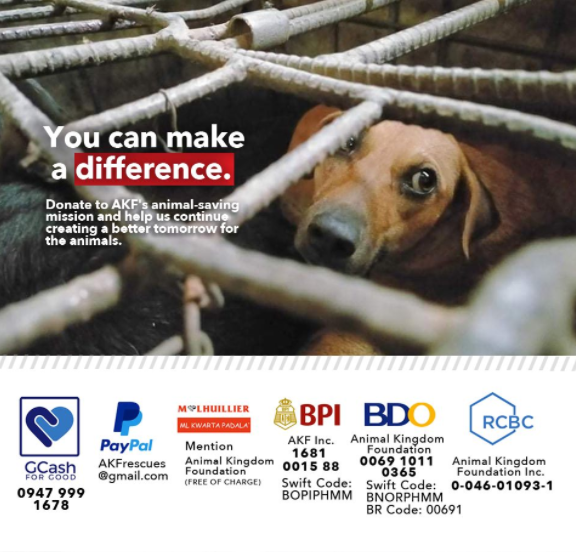While we spend the majority of our time at home due to quarantine constraints, having a furry friend helps alleviate stress and loneliness, according to a study. With everything going on in the world, many animal shelters in the Philippines are encouraging everyone to ‘Adopt, Don’t Shop’ and ‘Save the Strays’ amidst the pandemic.
Mitzi Cruz, shelter manager, of the Philippine Animal Welfare Society of the Philippines (PAWS Philippines), and Heidi Marquez-Caguioa, a lawyer and the program director of Animal Kingdom Foundation (AKF), both noted that adopting enables an individual to “help save lives” and “make a difference.”

“When you buy a pet, you make a business person profit so that they can continue the breeding cycle and profit again. There are far too many homeless animals waiting for a family to take them in, that deliberately adding more to the population, especially for profit, cannot be justified,” said Cruz.
“Adopting a pet helps [us] in [fighting] against puppy mills. If more people adopt from any shelter or pound the demand for breed dogs goes down and cruelty in puppy mills will be greatly reduced. You can also be sure that you do not contribute and took part [in] the cruelty cycle involved in puppy mills,” said Marquez-Caguioa.

However, campaigns such as adoption and donation drives do not cut it as Cruz shared that the PAWS shelter is always overpopulated. “There is never a time when there is an empty kennel waiting for a new rescue,” she said.
On average, PAWS are only able to rescue 1-2 animals in a month. She also mentioned that there are other ‘rescues’ performed by non-PAWS citizens wherein the pets are admitted depending on the availability of a foster parent.
Similarly, Marquez-Caguioa said that during the height of the dog meat trade, AKF intensified its rescue efforts having over 1,500 dogs in their shelter.
“Adopting reduces euthanasia in pounds. For shelters like AKF’s Rescue center, it allows [us] to free up some space for another rescue that may just need some help and saving,” Marquez-Caguioa said.
On being responsible pet owners
In becoming a responsible pet owner, “compassion” must be present, said Marquez-Caguioa.
“Everyone can be a responsible pet owner if they choose to. It starts with being compassionate, respectful and caring not just to your pets but to others as well,” she added.
Marquez-Caguioa also said that responsibility is understanding the needs of our pets—from healthy food, clean water, proper shelter and veterinary care to being mindful of the other pets and other people around by respecting space.
“Knowing risk for bites and attacks outside of your home and maintaining cleanliness in your neighborhood by cleaning up after your pets when they poop outside, [because] leaving dog/cat poops outside [is] the most common cause of quarrel among neighbors. This can be avoided by scooping and cleaning after your pet finishes his/her business which is basic in pet responsibility,” she said.
Meanwhile, Cruz added that PAWS Philippines conducts seminars on how to be a responsible fur parent. “In a nutshell, a responsible pet owner is someone who provides at least the basic needs of their pet and human companionship.”
Pet owners must also be law-abiding citizens adhering to Republic Act 9482 or the Anti-Rabies Act of 2007, wherein owners must not permit their pets to roam public places and are responsible to clean up after their pets.
Ensuring the safety and welfare of pets who are up for adoption
But before any dog or cat is adopted out the rescue center, PAWS Philippines and AKF ensures that the pets are going to be well taken care of. For PAWS, Cruz said that they adhere diligently to their biggest contribution in ensuring safety of animals–Republic Act 8485 or The Animal Welfare Act of the Philippines.
“In terms of rescued pets that [we] rehome, PAWS has very strict screening protocols in place. Adoption applicants will be denied if they are seen to be unable to provide a safe home or care for a pet. PAWS actively files and has won cases against animal offenders, and at the same time provides free legal assistance to those wanting to press charges against people who are neglectful or abusive towards animals,” she said.
On the other hand, Marquez-Caguioa shared that prospective adopters are thoroughly assessed and pre-qualified. “Before any dog or cat is adopted out from our Rescue Center, we have standard checks and would usually require adopters to visit the shelter and we also do subsequent home visits,”
However, due to the pandemic, their assessment has now become virtual. According to Marquez-Caguioa, “Our home visits have gone virtual instead. We ask adopters to send video or pictures of their homes and we deliver selected dogs to their houses which also already serves as our home visit.”
“If our adoption team [is] not happy with what they see, they would usually just bring the dog back to the Center and look for another candidate adopter. An after adoption check is likewise usually being undertaken just to make sure that both the adopter and the pet are coping well with each other and with its new environment and family,” she added.
What more can we do?
Both Cruz and Marquez agreed that using modern tools and platforms can greatly contribute in spreading awareness. They encourage everyone, especially the youth, to be influencers and advocates in helping to promote adoption by connecting those who want to have a pet and convince those who want to buy to adopt instead.
Cruz: If you can’t adopt, foster. If you can’t foster, volunteer. If you can’t volunteer, donate. If you can’t donate, educate. Educate yourself first, then share the education. Start with your inner circle by telling your friends and family to do the same. Use whatever platform is available — social media, art, literature, etc.
Marquez-Caguioa: They can support an organization like AKF and partner in the promotion of their adoption program and help in the search and linking of adopters to them. Volunteering with AKF in the rehabilitation of dogs and cats will also greatly increase the chances of these [pets] to be adopted and posting their pictures with these adorable rescues, on their own social media can spread the information already.
Aside from visiting the PAWS Philippines and AKF websites to know more about their respective pet adoption process, here’s a list of animal organizations you can also reach out to:
- PAWSsion Project
- Strays Worth Saving
- CARA Welfare Philippines
- Adopt A Pet Philippines
- Pet adoption and rescue Philippines
- Animal Rescue PH
Adopting costs less than buying. So why spend more when you are getting the same amazing and adorable pet?
POP! Creators/Ariane Vien Afan
________
DISCLAIMER: All views and opinions expressed in this post are solely those of the contributor/s and do not represent those of InqPOP! and INQUIRER.net. The InqPOP! staff assumes no liability for any error in the content of this material. Got something you want to share to the world? Get a chance to publish your awesome creations and share it to the world through our InqPOP! Creator Community program. Send us your stories, videos, photos, fan fic, and even fan art at pop@inquirer.net
For more details, read the POP! Creators FAQ page.


